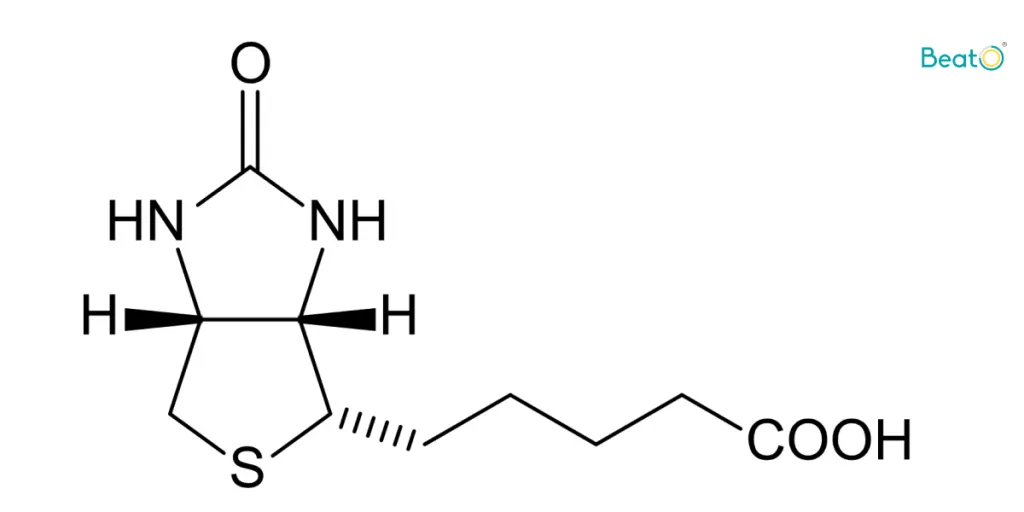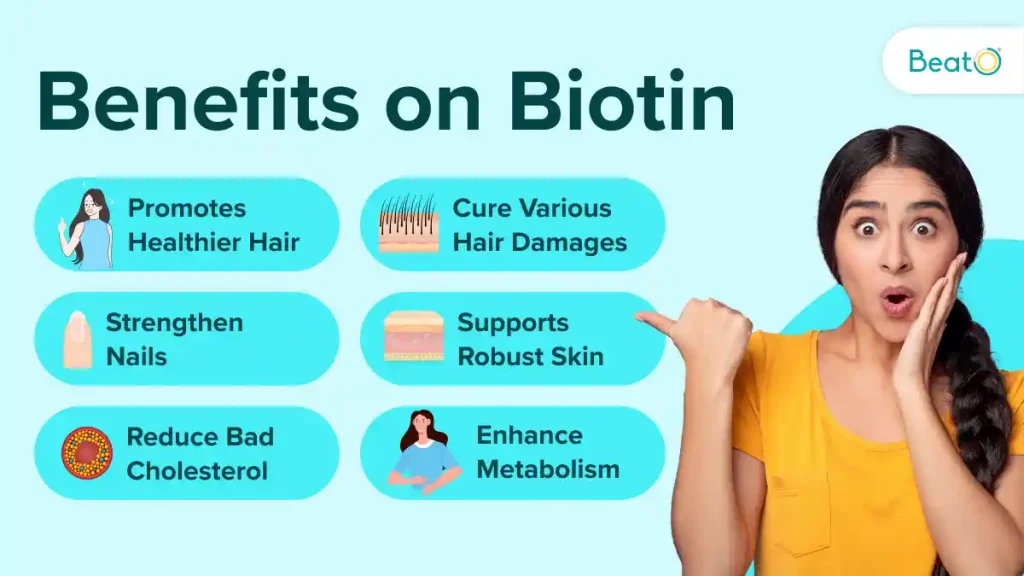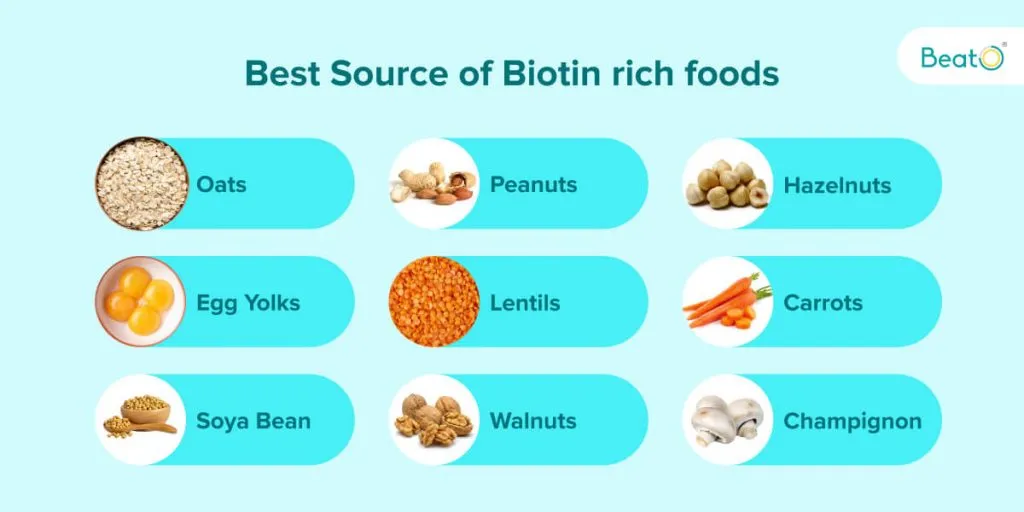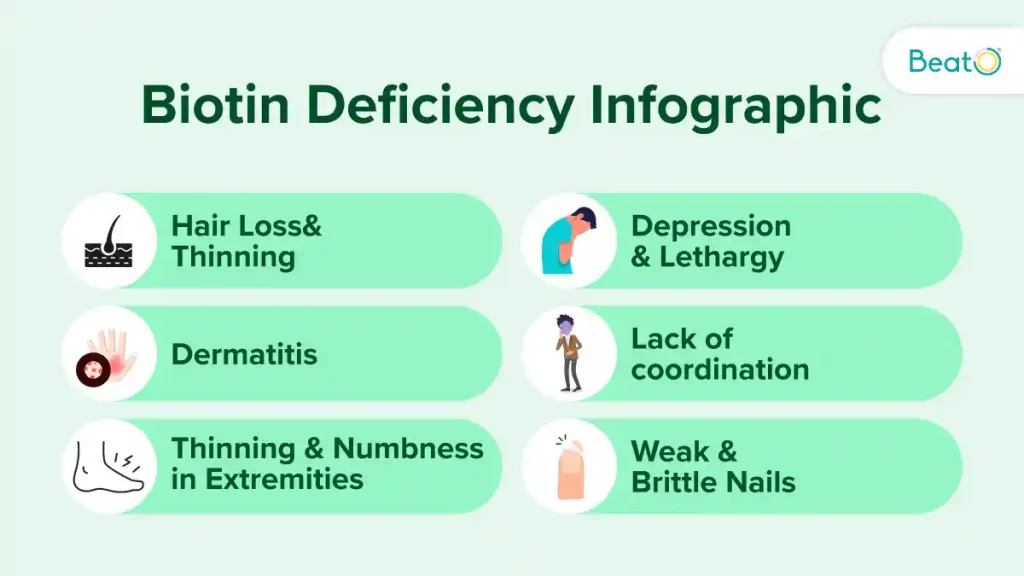Biotin, or Vitamin B7, is one of the unsung heroes of our body’s nutritional army. It plays a pivotal role in maintaining healthy hair, skin, and nails and is a key player in the metabolic process, converting food into energy. Despite the known benefit of Biotin rich foods it often gets overlooked. So let’s look into this essential nutrient and explore some foods rich in Biotin.

Also Read: Health Benefits of Cashews- Nutty Support for Diabetes Management
How Much Biotin We Need?

Determining the exact amount of biotin needed per day can be complex as it may depend on various factors such as age, gender, overall health, and specific conditions like pregnancy or breastfeeding.
According to the Office of Dietary Supplements (ODS), the adequate daily intake of biotin for adults is generally considered to be 30 micrograms (mcg). This recommended daily intake increases to 35 mcg for women who are breastfeeding, to support the increased nutritional demands during this period.
In terms of dietary consumption, research indicates that the typical diet in Western populations provides between 35 to 70 mcg of biotin each day. This is usually sufficient to meet the average adult’s daily requirements, considering that biotin is found in a wide variety of foods, including eggs, fish, meat, seeds, nuts, and certain vegetables.
The Multifaceted Benefit of Biotin Rich Foods

In the world of health and beauty, the demand for biotin is soaring high, and it’s no wonder why. This essential nutrient plays a crucial role in keeping our hair, skin, and nails healthy. Let’s take a deep dive into the incredible health benefits of incorporating biotin-rich foods into your diet.
1. Promotes Healthy Hair, Skin, and Nails
We all have heard of the claim that biotin is good for our hair, skin and nails. When dermatologists discuss Biotin Rich foods, they often refer to the nutrient as one that can be used to improve the appearance and condition of the hair and nails on the body. Waving farewell to brittle nails, pale skin and lifeless hair – biotin has your back.
Also Read: Health Benefits of Sprouted Moong: Unveiling the Diabetic’s Nutrient-Rich Secret
2. Diabetes Management
Studies suggest that biotin supplements could be a game-changer for individuals managing diabetes. These supplements have shown promise in regulating blood sugar levels, reducing cholesterol, and improving lipid profiles in some diabetic patients. While they may not have a significant impact on insulin levels, the B vitamins, including biotin, are vital for keeping your brain and nervous system in tip-top shape.
3. Supports Eye and Skin Health
Biotin doesn’t just stop at hair and nails – it also plays a key role in maintaining healthy skin, eyes, and overall well-being. By keeping your skin well-hydrated and preventing dryness and irritation, biotin ensures that you’re always glowing from within. And when it comes to eye health, biotin plays a role in eye health by helping to ensure the proper function of the nervous system.
4. Essential During Pregnancy
Biotin is one of the essential vitamins during pregnancy and breastfeeding. It supports fetal development and helps ensure the health of the mother. However, it’s important to note that pregnant or breastfeeding women should consult their healthcare provider before taking biotin or any other supplements.
Read More:Proven Health Benefits of Peanuts- A Nutty Approach to Diabetes Control and Wellness
5. Supports Nervous System and Brain Health
Biotin is also a key player in supporting your nervous system and brain health. By aiding neurotransmitter activity and nerve signal transmission, biotin keeps your cognitive function in check and may even contribute to a brighter mood.
6. Potentially Protects the Heart
While more research is needed, initial findings suggest that biotin may offer some benefits for cardiovascular health. When combined with other B vitamins, biotin could potentially help reduce inflammation – a known risk factor for heart disease. Keep an eye out for further studies on this promising front.
Also Read: Proven Health Benefits of Green Beans: A Diabetes-Friendly Feast for Health and Flavor
Biotin Rich Foods that you must include in your diet

Biotin contributes to maintaining healthy hair, skin, and nails, making it a popular supplement in the beauty industry and the benefits of Biotin Rich foods are unmatched. In case you don’t want to rely on supplements, here is a list of Biotin rich foods:
1. Egg Yolks
Egg yolks, often overlooked in favour of egg whites, are bursting with biotin. So next time you crack open an egg, don’t forget to include the egg yolk of some eggs.
2. Legumes
From peas and beans to lentils and chickpeas, legumes are a great source of biotin. They’re also packed with protein and fibre, making them a nutritious addition to any meal.
3. Nuts and Seeds
Nuts and seeds like almonds and sunflower seeds are not just snack-worthy – they’re also rich in biotin. Sprinkle them on your salad or munch on them as a midday snack.
Also Read: Unlocking the Top 10 Health Benefits of Kiwi Fruit
4. Sweet Potatoes
Sweet potatoes are not just delicious; they’re also one of the highest plant-based sources of biotin. They’re also packed with vitamin A and fibre, making them a healthy choice for any meal.
5. Meat and Fish
Salmon, tuna, pork chops, and hamburgers are all rich in biotin. Organ meats, such as liver, are particularly high in this vitamin.
6. Spinach
Spinach is not just rich in iron and calcium; it’s also a good source of biotin. Add it to your salads, or smoothies, or sauté it as a side dish. You can even have spinach in the form of Spinach soup in winter as well as spinach (Palak) sabzi which is quite popular here in India.
Read More:Top 10 Health Benefits of Jowar (Sorghum)
7. Mushrooms
Mushrooms are a delicious and versatile food that also happens to be a good source of biotin. They’re low in calories and provide important nutrients like vitamin D and potassium.
8. Avocados
Avocados are more than just the star ingredient in guacamole. They’re packed with healthy fats, fibre, and several vitamins and minerals – including biotin.
9. Yeast
Used in bread-making and beer brewing, yeast is a rich source of biotin. Inactive yeast known as nutritional yeast is frequently used to produce non-dairy cheese. Up to 21 micrograms of biotin is present in two tablespoons (16 grams) of yeast. So next time you enjoy a slice of bread or a cold beer, remember you’re also consuming some biotin.
Read More:12 Amazing Benefits of Prickly Pear (Cactus Fruit) for Skin, Hair, and Overall Health
10. Dairy
The biotin content in these dairy products is not high, but they contribute to your overall daily intake.
Here’s a closer look at the biotin content in specific dairy products:
- Cheddar Cheese: A 28-gram serving of cheddar cheese contains approximately 0.4 micrograms of biotin. In addition to biotin, cheddar cheese is also rich in other nutrients like calcium and protein.
- Milk: A 1-cup (128-gram) serving of 2 per cent milk provides about 0.3 micrograms of biotin. Milk is also an excellent source of calcium, vitamin D, and protein, making it a nutritious addition to your diet.
- Yogurt: A 1-cup serving of plain yoghurt (approximately 128 grams) offers around 0.2 micrograms of biotin. Besides biotin, yoghurt is known for its probiotics, which are beneficial for gut health, along with other nutrients like calcium and protein.
Also Read: Health Benefits of Mushrooms: Savory Superfoods in Diabetes Management
What happens if you are deficient in Biotin?

It’s quite uncommon to experience a biotin shortage, particularly if you’re in good health and consume a balanced diet. However, if biotin levels are low, certain symptoms can gradually appear. These may encompass:
- Hair thinning (alopecia)
- A reddish rash around your eyes, nose, mouth, and genital region
- Weak nails Feelings of depression
- Fatigue (energy deficiency)
- Hallucinations
- Numbness in your limbs (hands or feet)
- Convulsions
Health Risks
Studies indicate that the consumption of biotin supplements, even in substantial quantities, carries minimal risk. Biotin is a water-soluble vitamin, meaning any excess not utilized by your body is expelled through your urine. However, even though the benefit of Biotin Rich foods can’t be overlooked, its overconsumption could potentially interfere with other medications or lead to inaccurate lab test results. It’s crucial to always inform your healthcare provider about any dietary supplements you’re taking.
Also Read: Exploring 10 Health Benefits of Ragi (Finger Millet)
Conclusion
Biotin or Vitamin B is a water-soluble vitamin that helps generate keratin that maintains healthy hair, skin and nails. It also helps your body convert proteins and carbohydrates you eat into glucose which gives you energy. Biotin is an essential vitamin and some of the Biotin rich foods are Egg Yolks, Legumes, Nuts, Mushrooms, Spinach etc. It is essential to include these foods into your diet as the benefit of Biotin Rich Foods are unmatched.
Disclaimer:The content of this article is compiled information from generic and public sources. It is in no way a substitute, suggestion, or advice for a qualified medical opinion. Always consult a specialist or your own doctor for more information. BeatoApp does not claim responsibility for this information .
Dr. Navneet Agarwal is an established and highly skilled Diabetology with over 25 years of experience in Diabetology & Obesity. He is well-regarded for his quality and patient-centered diabetes care. Also, keep track of your blood sugar levels with a Doctors’ approved smart glucometer and elevate your healthcare routine.




